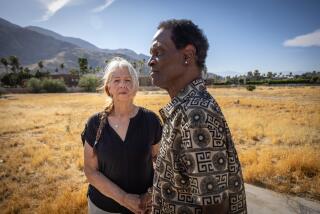Kern County Town Struggling to Overcome Its Racist Image : Prejudice: Some say Oildale no longer deserves that reputation, but others say that blacks are still not welcome in community.
- Share via
OILDALE, Calif. — Two generations after it first brimmed with Dust Bowl migrants, this sprawling oil town remains saddled with a reputation for roughnecks and racists.
Some residents claim that the lingering stigma is unfair. But others point to recent hate crimes and say Oildale remains a mostly white enclave where blacks are not safe.
“If you’re black, you’re always looking over your shoulder,” said Art Powell, a former president of the NAACP chapter in nearby Bakersfield.
“You’re always wondering if one of those clowns might be around the corner.”
David Brandon of the Chamber of Commerce denies that Oildale is a pocket of racial hatred.
“There’s no more racial bias here than anywhere else,” he said.
But Powell contends that two recent attacks on black motorists underscore racial attitudes dating back to the 1930s, when swarms of rural southerners from Oklahoma, Arkansas and Texas sought a better life in California.
“Oildale has some good people, too, but there are others who are looking for someone to hate. For years, it’s been blacks,” Powell said.
In one case that resulted in federal civil rights convictions, two Oildale men repeatedly stabbed a man in a racial attack. He survived and testified against his assailants.
In another, a black woman’s car windshield was smashed, allegedly by a white man who hurled racial insults. A judge has refused to accept a plea bargain, saying an agreed-to one-year jail term for the defendant wasn’t severe enough.
Cabdriver Ed Woodruff picks up fares in Oildale even though he is black, but he says other black drivers won’t make the short trip from Bakersfield because it’s either too dangerous or a waste of time.
“I’ve really been abused when I’ve gone to pick up a fare,” Woodruff said. “In bars, I’ve been told: ‘We don’t like niggers in here.’ Or they’ll signal the bartender and say they didn’t call a cab. You know it’s only because they don’t want to ride with a black.”
Woodruff says a watermelon was placed on the front porch of one black family that moved to Oildale. Racist literature appears in mailboxes and on doorsteps. He has watched Ku Klux Klan rallies and cross burnings on the only bridge that separates Oildale from Bakersfield, 100 miles north of Los Angeles.
“The message to blacks is: ‘Don’t cross,’ ” Woodruff said.
Donnie Stubblefield, 21, who is white, said: “Oildale is for white people. They don’t care much for blacks.”
But community leaders in this town of 25,000 say that reputation is outdated and overblown.
“That whole ‘Grapes of Wrath’ image formed years ago, and we kind of got stuck in that mode,” said Carol Powers. She is spearheading a Chamber of Commerce effort to upgrade the town’s image and attract new business.
“There are a few immature people,” Powers added. “That’s frustrating because outside people don’t get to see the good things.”
Oildale is no longer a hotbed of racism, but reputations die hard, said high school principal Bill Bimat.
“The community is more diverse and more accepting today,” he said. “Thirty years ago a black couldn’t buy a house, couldn’t work here, and literally would’ve been run out of town.”
Bimat, who graduated from the high school he heads, has set up a Prejudice Free Week and a special committee to educate students on minority issues. The school of about 2,000 students has only a dozen black students but a growing percentage of Latinos.
“I suppose we try a bit harder because of our situation,” said Bimat. “I still believe in the old melting pot theory. Diversity is a good thing. Let’s celebrate it.”
UC Berkeley historian James Gregory says racial superiority was a source of pride among farm, oil field and railroad workers who migrated to Kern County in the 1930s. Racism, he says, helped unite the migrants.
Gregory, who has written a book on the westward Dust Bowl migration, says the southern San Joaquin Valley has a history of being “inhospitable to racial liberties and civil rights causes.”
Richard Prado of the Kern County Human Relations Commission agrees that racism’s roots are not easy to trace but says they might run deeper in Oildale.
“Prejudice and racism penetrate all society, but in some parts of the country those attitudes are much stronger,” he said. “Oildale is one of them.”
More to Read
Sign up for Essential California
The most important California stories and recommendations in your inbox every morning.
You may occasionally receive promotional content from the Los Angeles Times.










